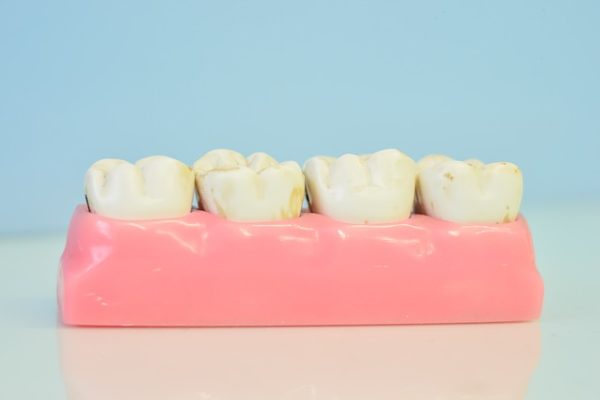Signs of Gingivitis
One of the early signs of gingivitis is bleeding gums. Gingivitis is a milder, earlier form of periodontal disease or gum disease. This condition is often found in older patients but can be present at all ages.
When gingivitis first develops, the overgrowth of plaque is accumulated on the gums and teeth. As a result, gingivitis usually causes red gums to appear smooth, shiny, and swollen. You can tell if your gums are healthy if they appear coral pink in color.
Medication
It’s essential to look at any medications you have been taking as certain prescriptions can cause blood thinning and bleeding gums. The American Dental Association has a list of medications may contribute to bleeding gums.
Smoking
While smoking has a lot of negative symptoms, yet another is bleeding gums. Smoking causes inflammation, enlarged gums. The bleeding gums can look like signs of gingivitis but not always.
The best thing to do in this situation is either cut back on smoking or talk to a dentist to see what can be done in maintaining gum health.
Inadequate hygiene
Haven’t been properly taking care of your teeth? This is a prevalent reason for bleeding gums, as you can probably imagine. Failure to properly brush and clean your gums especially leads to a buildup of plaque, causing inflammation, redness, and bleeding of the gums. If left too long, gingivitis may develop in the future.
Diet
A change in diet or even a lack of a nutritious diet could very well lead to an unhealthy oral system, including bleeding gums. Choose foods that are healthy and filled with vitamins and minerals, and try to ditch sugary and processed foods as much as possible.
Receive all the nutrients you can, even if they have to be obtained through vitamins and supplements. Talk to a doctor if you believe you’re not receiving a well-balanced diet or drastically changed your current diet.
Stress
Stress has an immense effect on our state of mind, body, health, and general wellbeing. Being in a constant state of stress is harmful to your immune system.
When your immune system is weak, this could also lead to higher risks of gum disease and bleeding gums. Keep your stress levels in check, and help your immune system by getting proper sleep, eating a well-balanced diet, and exercising.
Pregnancy
Hormonal changes during pregnancy can also cause bleeding gums. Your gums become more sensitive to plaque, causing the gums to bleed easier.
In fact, about half of all expecting mothers have symptoms of redness, inflammation, and tenderness of their gums when brushing and flossing. This is often referred to as “pregnancy gingivitis.”
Overload of toxins
Swollen, tender, or bleeding gums may also be caused when the lymphatic drainage in the mouth area is not working correctly due to an overload of toxins in the intestines and/or excess acidity in the blood.
At the end of the day, this is the main cause of most diseases, and gum problems are just another sign that we must improve our organs’ functioning.
How to Overcome Signs of Gingivitis
The good news is that gum health can be restored through…
Increase how often you brush and floss
Never neglect brushing and flossing twice a day.
It is recommendable to use to a fluoride-based toothpaste to help prevent tooth decay and other kinds of oral problems. Take note that toothpaste acts as gentle abrasive which considerably aids in removing plaque.
While some people recommend the use of salt water on a toothbrush to aid get rid of plaque, it has been proven through research that fluoride-based toothpaste is more effective in eliminating plaque and reducing dental caries. If you have early signs of gingivitis, your dentist may also schedule more frequent visits.
Eating adequate nutrients
Start by eating better, more nutritious meals. Our diet should be rich of various foods including fresh fruit, vegetables, whole grains (rice, millet, quinoa, oats, etc.), nuts, dried fruit, seeds (sunflower, sesame, pumpkin, etc.), brown rice, and green beans.
Moderate acidifying foods in your diet including carbohydrates and white sugar. Instead, focus on a diet rich in vitamins and nutrients vital for oral health.
Working on your gut health
The gut affects inflammation in our intestines. In this case, we must also take care to avoid any dysfunction. For example, if you suffer from constipation, start by consuming on foods such as honey, linseed, prunes, dates, hazelnuts, fresh figs, kiwi, chestnuts, psyllium, green tea, charcoal, garlic, and kuzu.
An additional and effective way to improve gut health is to partake in the apple cider vinegar detox or neutralize the stomach with lemon water before and after meals. Magnesium supplements are also a big help.
Vitamin C can help us improve gum problems. We can consume a daily supplement or chow down on citrus (oranges, lemons, grapefruits, etc.), pineapple, strawberries, papaya, and guava to receive an adequate supply of vitamin C.
Get in contact with a doctor if your gut health is in a severe state. Such problems may take longer to fix for some than others.


